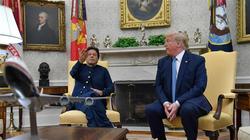 It is no coincidence that a debate about potential recognition of Israel has popped up on mainstream Pakistani media in the immediate aftermath of Prime Minister Imran Khan’s recent meeting with President Donald Trump of the Unites States, and amid expanding ties between Saudi Arabia and Israel, a commentator argues.
It is no coincidence that a debate about potential recognition of Israel has popped up on mainstream Pakistani media in the immediate aftermath of Prime Minister Imran Khan’s recent meeting with President Donald Trump of the Unites States, and amid expanding ties between Saudi Arabia and Israel, a commentator argues. RNA - “With Pakistan reaffirming its status as Saudi Arabia’s newest client state during Crown Prince Mohammed bin Salman’s visit to Islamabad earlier this year, and the US using the financial bailout carrot to push Pakistan into complying with Washington’s interests in the region, the conditions required to make a formal move on Israel are there,” Kunwar Khuldune Shahid wrote in a recent article published by Israel’s Ha'aretz daily.
“Although tentative steps towards ties with Israel will likely have to wait till Saudi Arabia formalizes relations with Israel, given how that particular relationship is developing so swiftly, coupled with Washington and Riyadh pushing for the isolation of Iran,” he added.
The author said the once-taboo subject of Islamabad probing potential relations with Israel had undergone a sea change and was entering the mainstream discourse.
Khan and his backers within the military, the author explained, were giving unprecedented freedom to highly-censored media to talk about establishing relations with Israel.
Even so, the debate has skyrocketed over the past couple of weeks, with leading journalists like Kamran Khan and Asma Shirazi endorsing formulation of diplomatic ties with Israel.
For an instance, Kamran Khan, a veteran Pakistani journalist and editor-in-chief of one of the most influential media groups in Pakistan, has asked on Twitter: “Why can’t we openly debate pros cons of opening direct and overt channels of communication with the State of Israel?”
The journalist has triggered thousands of responses about the sensitive topic.
High time Pakistan counter nefarious Indian designs with bold foreign policy moves. Our deepest friends making fresh alignments. No permanent friends no enemies. Why can’t we openly debate pros cons of opening direct and overt channels of communication with the State of Israel
— Kamran Khan (@AajKamranKhan) August 25, 2019
A tweet last October by Ha’aretz English editor Avi Scharf sparked rumors of Israeli Prime Minister Benjamin Netanyahu secretly visiting Islamabad. In February this year, Foreign Minister Shah Mehmood Qureshi told the Israeli newspaper Ma’ariv that Pakistan wants "normal ties" with Israel.
Given the criticism in Pakistan over Islamabad’s inaction over India’s annexation of Kashmir, the government can actually sell its recognition of Israel as a bid to counter India.
The writer further says Khan and his Pakistan Tehreek-e-Insaf (PTI) ruling party are bound to pay some domestic political price for tentative normalization. Khan is guaranteed protection against domestic backlash by the military, which would hope to benefit from formal defense ties with Israel.
He believes Pakistan's founding father and some other leaders were against maintaining any ties with Israel
Following Israel’s declaration of independence, its first prime minister, David Ben-Gurion, sent a telegram to the founder of Pakistan, Muhammad Ali Jinnah, in a bid to establish diplomatic relations. There was no reply.
Pakistan’s first Foreign Minister Zafarullah Khan vehemently opposed the idea of such a relation based on Jewish nationalism in the United Nations General Assembly session in October 1947.
In the 70s, Pakistan was led by Zulfiqar Ali Bhutto, who according to his close aides had a hatred for Israel, but at the same time did not conceal his dislike for Arabs.
In August 1994, then Prime Minister Benazir Bhutto would not visit Gaza City, because that visit would have required coordination with Israel.
The journalist believes that almost the entirety of Pakistan’s backdoor dealings with Israel have been owing to Islamabad’s subservience to the US over the past few decades.
The 1980s underlined the extremes of Pakistan’s paradoxical position on Israel.
With the backing of the US and Saudi Arabia, perhaps the greatest oddball was thrown by dictator Zia-ul-Haq, when he asked the Palestine Liberation Organization to recognize Israel in March 1986.
According to Press TV, Pakistani and Israeli foreign ministers held their first ever publicly acknowledged meeting on September 1, 2005 in Ankara
The then military dictator General Pervez Musharraf had been setting the ground for that meeting after opening the debate on relations with Israel in Paris in 2003.
In a 2012 Ha'aretz interview, Musharraf explained the basic pragmatism behind his view.
"Right from the beginning… we have been pro-Palestine. But I believe in realism and in assessing ground realities... A lot has happened since '48, and one has to adjust… Policies should not remain constant. Israel is a fait accompli. A lot of the Muslim world have understood that and I know many Muslim countries have relations with Israel, whether above board or covertly… Pakistan also needs to keep readjusting its diplomatic stand toward Israel based on the mere fact that it exists and is not going away."
"Former president Musharraf’s positive statements about ties with Israel clearly echo the views of Pakistan's corridors of power, perhaps the most salient indicator that Islamabad's ruling class are encouraging this talk is that it’s the leaders of the PTI, a party completely reliant on the military for support, who are engaging in such a sensitive subject," Shahid argued in his article.
Pointing to hurdles on the way to recognition of Israel, the author concludes by saying it seems clear that the next formal meeting between Pakistan and Israel will not take another five decades.
847/940